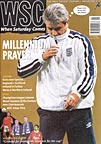 Supporting England still has its problems as Martin Cloake finds out
Supporting England still has its problems as Martin Cloake finds out
It may now be acceptable to admit to being a football fan in polite company, but declare yourself an active England supporter and the old suspicions resurface. Watching the telly and wanting England to win is fine, but actually going or, worst of all, following England abroad, surely means there is something wrong with you.
Supporting England has always been tricky because of the baggage that comes with it. Or rather, the baggage you’re lumbered with. I was born and brought up in north London, with an English mother and an Irish father. I think of myself as British. I’ve never had a problem with being proud of my country, partly because I see its achievements as having been forged by its people and partly because of an affinity with the familiar physical details of the country in which I grew up. I see my country as Britain, and I support England for the same reason I follow Spurs – it’s the local team. When England play Scotland I like England to win almost as much as I like Spurs to beat Arsenal.
I offer the personal details not because I think you are in the slightest bit interested in me, but in order to illustrate the point that “England fans” – whose arrival at Dutch and Belgian ferry terminals next summer is already eagerly awaited by the tabloids – are not a homogeneous mass, but a set of individuals.
For most people, being proud of where you come from isn’t a problem. But Britain had the world’s largest empire so, the thinking goes, you can’t be proud to be British without celebrating the subjugation of others. This imperial legacy and its influence on how we define ourselves is the subject of an important and timely collection of articles, edited by Mark Perryman, called The Ingerland Factor.
It’s essential and fascinating reading, but unfortunately the solutions floated by a number of its contributors threaten to fuel the very thing they argue against – a resentful, bellicose English nationalism. (We hear plenty of the latter at every England home game. The home fans attending the Euro 2000 play-off at Wembley might claim that the hostile reception given to God Save The Queen justified their shouting down of Flower of Scotland but you can bet that many of them would have done it anyway.)
This is a thread of opinion that welcomes a future in which Britain is part of a single European state. Emma Poulton comments, in a otherwise well-argued piece, that “many of the English are also failing to come to terms with a minor role in a Franco-German-driven Europe, sensing an increasing loss of sovereignty to Brussels”, as if this were a bad thing. Tell people they are reactionary for opposing a further watering down of the influence they have over how their country is run and they will eventually conclude that they are.
One problem with the baleful legacy of the empire is that England has been left to shoulder its burden alone. Much Scottish and Welsh nationalist sentiment conveniently forgets the empire was British, not just English. The more bone-headed English football fans, of course, are only too happy to reinforce this version of history, equating England with Britain when it suits them and falling back on a separate English triumphalism when it doesn’t.
This process of dumping those bits of history we don’t want on our neighbours will lead to the Balkanisation of Britain – something which Sir John Hall’s crazy concept of a “Geordie nation” clearly points towards. Yet that fragmentation is something a number of writers in The Ingerland Factor seem to welcome. Billy Bragg, for example, writes: “Blair’s promise of a referendum on joining the Euro will give the people of England the chance to vote for or against the British state and all that it stands for. A vote against [the state] will give a clear sign that, whilst we respect the past, we are no longer in thrall to it.”
Where does all this leave England fans? Well, still supporting England. Because the crisis of national identity cannot be dealt with by giving up any identity. The argument that we should stop drawing on the past to define ourselves is clearly nonsense. We cannot deny our history, and it would be foolish to refuse to learn from it.
By taking our virtues as a starting point, rather than basing our identity on a rejection of the negative points ascribed to us, we can forge a confident and vibrant national pride, thereby providing a satisfactory response to the point Dominik Diamond raises in The Ingerland Factor when he says: “It would be interesting to see what would happen if the ‘innocent majority’ of English fans decided to take the ‘mindless min- ority’ in hand next time it kicks off on some foreign field.” Developing positive expressions of national pride provides a fresh centre around which to congregate, and gives us the chance to squeeze out those who see violence as a preferable expression of national pride. The Ingerland Factor is an important part of this process because its existence in itself represents a refusal to concede space to the fascists, xenophobes and their fellow travellers.
I don’t think the British or English are better than anyone else. I just enjoy and celebrate differences, because I would hate a world in which we were all the same. I hate the national anthem because I don’t see how you can express pride in being a subject – and because it’s such an awful dirge. But I call myself British, I’m comfortable with supporting England as a part of that and I don’t feel I have to abuse my girlfriend’s Scottish father and German mother to prove my commitment.
From WSC 155 January 2000. What was happening this month